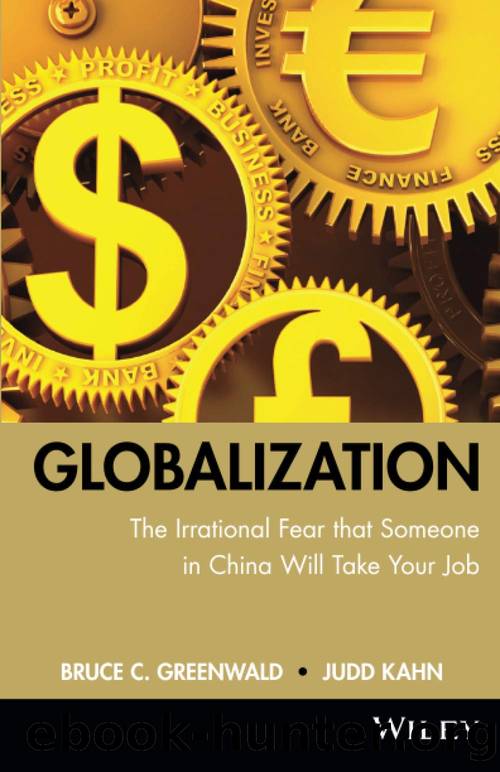Globalization: The Irrational Fear That Someone in China Will Take Your Job by Bruce C. Greenwald & Judd Kahn

Author:Bruce C. Greenwald & Judd Kahn [Greenwald, Bruce C. & Kahn, Judd]
Language: eng
Format: epub
Amazon: B0017SUYSM
Published: 2008-11-02T16:00:00+00:00
Profits in Protected Markets: Do They Survive?
So far, we have concentrated on businesses in industries and markets without significant barriers to new entry from competitors, including global competitors. They are not the only kind. Some companies, Coca-Cola being a good example, have historically earned annual returns on invested capital of well over 20 percent, which is a lot more than the cost of capital to them.Their stock trades for much more than the value of the net assets used in the business.Yet these returns, far in excess of what it would cost for a competitor to enter the business, have not been undermined by new entrants into their markets. Is that situation going to change in a global economy? Are these companies going to find their protected market positions disappearing? Or does globalization offer them lucrative opportunities to expand their profitable businesses into international markets?
History has not been kind to some of these types of companies. Consider the case of General Motors. From the 1930s to the 1960s, it dominated the domestic U.S. automobile market. Its average pretax return on capital was 45 percent in the 1960s, on a par with Coca-Cola. But in the 1970s, its position and its profitability began to erode as Japanese and European companies entered the U.S. market. Its average pretax return on invested capital fell to 28 percent in the 1970s, down substantially but still far above the cost of capital. GMâs situation worsened in the next two decades. Any barriers to entry that had protected it before appear to have largely disappeared, as Japanese and European cars flooded the U.S. market. The average pretax return in the 1980s was 8 percent, and that dropped to 6 percent in the 1990s. It has not turned around in the new century. GMâs is a cautionary tale about the impact of globalization in a previous era.
Why has it succumbed to competition when Coca-Cola has not? Product differentiation and branding, often cited as a strategy for coping with competition, are not the answer here. GMâs products are as differentiated and branded as Cokeâs. Clearly, brands were not sufficient to guarantee profits. In the newspaper industry, famous names such as the New York Times, the Wall Street Journal, and USA Today have been far less profitable, and less able to withstand the challenge from electronic media delivered over the Internet, than obscure local newspapers like the Buffalo Evening News or various Gannett papers. Brands with reputations for high quality, such as Mercedes-Benz, Sony, and Maytag, have fared less well than more prosaic brands like Tide detergent or Colgate toothpaste. Glamorous industries such as fashion apparel and cosmetics, with many high-profile brands, are often far less profitable than humdrum industries such as insurance or waste management. In financial services, prominent national banks such as Citicorp, Bank of America, and JPMorgan Chase are generally less profitable than smaller banks with lower profiles but strong local presences. Even Coca-Cola is a lot less prestigious than Mercedes-Benz, and a lot more profitable. Product differentiation and branding are not, by themselves, guarantors of profitability.
Download
This site does not store any files on its server. We only index and link to content provided by other sites. Please contact the content providers to delete copyright contents if any and email us, we'll remove relevant links or contents immediately.
The Fifteen Biggest Lies about the Economy: And Everything Else the Right Doesn't Want You to Know about Taxes, Jobs, and Corporate America by Joshua Holland(1126)
The Economist (20210109) by calibre(937)
The World For Sale by Javier Blas(865)
Made in China by Anna Qu(855)
Philippines--Culture Smart! by Culture Smart!(718)
Boom and bust a global history of financial bubbles by Quinn William Turner John(698)
Mission Economy by Mariana Mazzucato(691)
Forex Trading All In One For Dummies by Mishra Mamta(667)
Big Money by Kenneth P. Vogel(655)
The Money Revolution by Anne Boden(652)
The Dictatorship of Woke Capital by Stephen R. Soukup(650)
The New Retirement Savings Time Bomb by Ed Slott(639)
Tax the Rich! by Morris Pearl(636)
Green Public Procurement under WTO Law by Rika Koch(635)
Cross Winds: Adventure and Entrepreneurship in the Russian Far East by Myers Steven(630)
The Inflation Myth and the Wonderful World of Deflation by Mark Mobius(623)
European Yearbook of International Economic Law 2017 by Marc Bungenberg Markus Krajewski Christian Tams Jörg Philipp Terhechte & Andreas R. Ziegler(592)
Fundamentals of Finance by Mustafa Akan Arman Teksin Tevfik(592)
The Great Demographic Reversal by Charles Goodhart & Manoj Pradhan(585)
